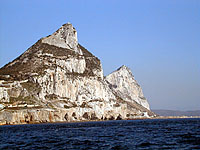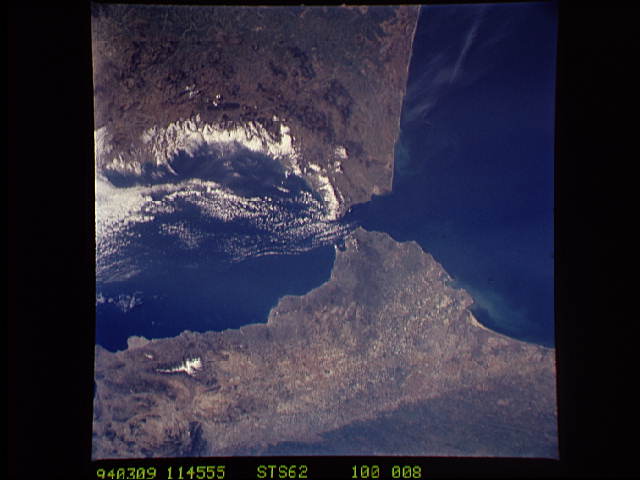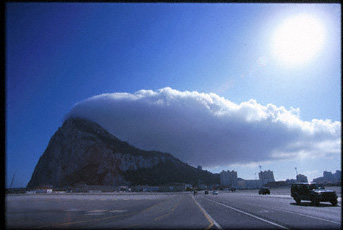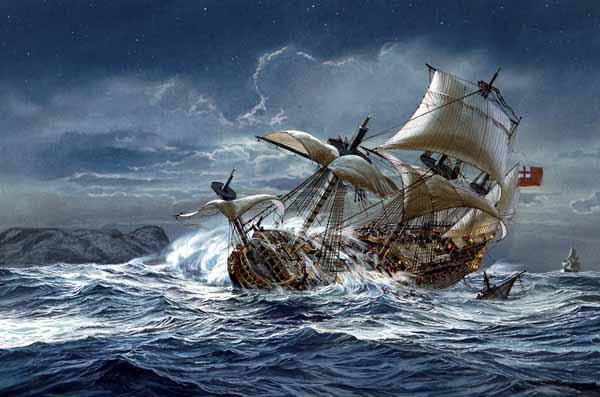|
Home
Film
Film
& DVD Archive
Music
Music
Archive
Television
Sport
Features
Features
Archive
Food & Drink
Food & Drink Archive
Wijke's Weather
Weather
Specials
Contact
Crossword
Guestbook
Donations
Classifieds
Links
Link To Us
Forum
Maillist
Scribe Weekly
Radio
Dedications for Scribe Weekly
Radio
Write
for Scribe Weekly
|
Winds
of the Mediterranean
Levante
BY Wijke
Ruiter
 A Spanish
holiday is not
complete
without a visit to the British mini state that is Gibraltar.
For this place is not just a rock; but the
gate-keeper to one of the worlds most puzzling seas; hiding secrets,
myths, stories, centuries of the worlds greatest history. The Strait of
Gibraltar has been a busy
sea lane since the ancient Phoenicians explored the world beyond this
Mediterranean Gate. A Spanish
holiday is not
complete
without a visit to the British mini state that is Gibraltar.
For this place is not just a rock; but the
gate-keeper to one of the worlds most puzzling seas; hiding secrets,
myths, stories, centuries of the worlds greatest history. The Strait of
Gibraltar has been a busy
sea lane since the ancient Phoenicians explored the world beyond this
Mediterranean Gate.
Tourist
guides say about the climate:
Gibraltar boasts a Typical Mediterranean Sub-tropical
climate. Warm weather throughout the year. Mild
winters with no snow, but summers can get hot and humid (between May to
September).
This maybe true,
but they rarley mention that this lovely, endless chanted, deep
azure-blue sea, has its
own terror in local winds. The ancient Phoenicians merchants must have
been
struggling and fighting for their lives with the unpredictable and
unreliable
wind of this Gate: the Levante. (Levanter in English).
It's a warm East
to Northeast wind
funneled through the Strait of Gibraltar, most frequent from July to
October and
in March, however it can occur at any time of the year. Bringing warm
and humid conditions to Gibraltar.
Its usually not more than a moderate breeze; about 4 beaufort in the
summer
period and
it's liable to
blow in fifteen days-spells. In winter, although less
frequent, it
sometimes blows a
gale-force; 8 to 9 beaufort; with heavy hurricane gusts. The
winter- levante often follow the end of gale-force Mistral
events.
This
specific Gibraltar-wind can occur when there is:

-
high pressure
over central Europe and relatively low pressure over the southwest
Mediterranean, or
-
high
pressure cell over the Balearic Islands (levante will be localized
around the Strait) or
-
an approaching
cold front from the west toward the Strait of Gibraltar.
What
makes the Levanter so special for Gibraltar?
Besides
its occasionally reinforced by the presence of an active depression to
the
South, by which it suddenly may intensify bringing heavy thundery rain;
the effects of
the wind are especially marked at Gibraltar.
The
most striking is the Levanter cloud.
In
winds lighter than force 5, a banner cloud, hanging around the top
of the Gibraltar rock and the city area. Its stretches out
from the summit for a mile or more to the west. The warm,
humid air has to rise against the rock; and cools down and
condenses.
When the wind exceeds to 6 beaufort, its strong enough to blow over the
top and
maintain its warmth, the air vapour will not condense and the cloud
lifts and
disappears.
But at
this force violent sea-currents and cross eddies are formed at the west
side of
 the "rock", very troublesome and
dangerous for sailors. The wind itself blowing strongly from time to
time in
opposite directions; whirling around, making sailors live more
difficult. the "rock", very troublesome and
dangerous for sailors. The wind itself blowing strongly from time to
time in
opposite directions; whirling around, making sailors live more
difficult.
The barometer and the thermometer are useful instruments to forecast a
levanter.
A coming Levanter
is indicated by light barometer failing and a marked rise of
thermometer. When blowing the barometer rises again. When this increase
is strong, its a sign the
Levanter will disappear next day, even if it's blowing with
gusts of
hurricane force.
The
Sussex. A long lost treasure.
Near
the Gibraltar rock rests on her seabed the richest shipwreck in history.
Its His Majesty's Ship Sussex, containing millions of pounds in cold
coins;
lost about 300 years ago.
As usual the British Admiralty investigated this accident. The records
say:
" They were caught is a levanter" trying to describe the
freak
winds that threatened to hurl the ship against the rocky Spanish shore.
"They attempted to tack into the wind, and run back around Gibraltar.
Within seconds, tens of thousands of gallons of water rushed into the
vessel's
open gun ports". The end came swiftly, while the admiral slept. He was
found clad only in his nightshirt.
|

 A Spanish
holiday is not
complete
without a visit to the British mini state that is Gibraltar.
A Spanish
holiday is not
complete
without a visit to the British mini state that is Gibraltar.

